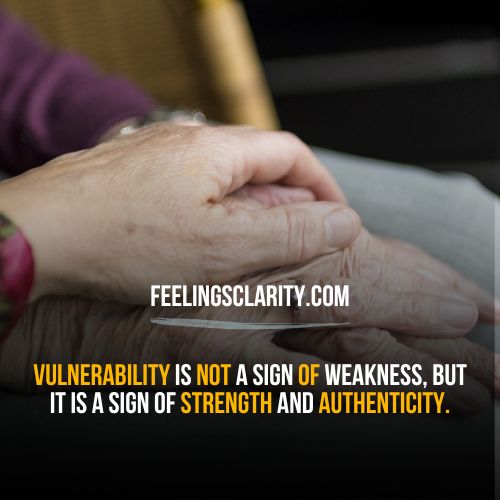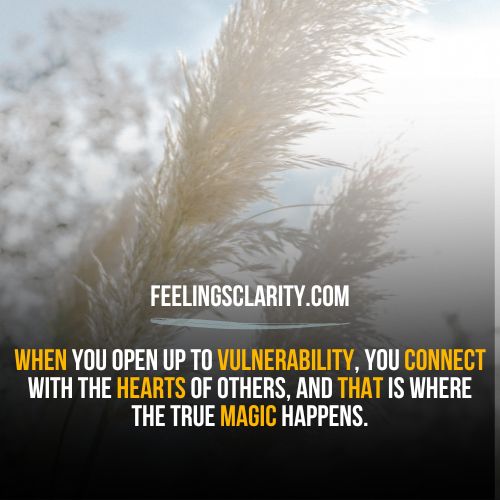Hey there! Have you ever heard of the word “vulnerability”? It’s all about being honest and real with ourselves and others. This is super important for growing as a person and building strong relationships.
Guess what? Some people have mixed-up ideas about vulnerability. They might think it’s not cool or that it’s weak. But you know what? That’s not true at all!
In this blog post, we’re going to explore these myths about vulnerability. We’ll talk about why they’re not right and why vulnerability is actually a really good thing. So, get ready to uncover the truth and learn why being yourself, flaws and all, is pretty awesome!

Jump to a Specific Section
Myth 1
Vulnerability is Equivalent to Weakness
Let’s dive into the first myth about vulnerability and clear up some misunderstandings. There’s a belief that being vulnerable is the same as being weak. It’s like thinking that showing your true feelings or admitting your mistakes makes you less strong. But hang on, that’s not the full picture!
This idea might have started way back when people thought that only tough folks were admirable. Back then, showing emotions or admitting faults was seen as something less powerful. However, times have changed, and our understanding has evolved.
In today’s world, we know that true strength doesn’t come from hiding your feelings or pretending to be perfect. Real strength comes from within – from having the courage to be honest about who you are, even when it’s challenging. It’s about acknowledging your emotions, even if they’re not all rainbows and sunshine.
Think about some of the people you look up to – maybe they’re celebrities, leaders, or even people in your life. Many of them have shown vulnerability by talking about their struggles, fears, or mistakes. It’s not easy to do that, but it’s actually a sign of immense strength and self-awareness.
So, the truth is that vulnerability requires a kind of strength that’s different from what some people might think. It’s not about being weak; it’s about being strong enough to face your emotions and share your authentic self with the world. It’s like flexing your emotional muscles and embracing your true power.
Myth 2
Vulnerability Means Oversharing Personal Information
Alright, let’s tackle another myth about vulnerability. Some folks believe that being vulnerable means you have to spill all your secrets and personal stuff to everyone. But hold on, that’s not quite accurate!
Imagine vulnerability as a painting. It’s about showing your true colors and letting people see the real you. However, it doesn’t mean you have to reveal every detail, like a private diary. That’s where the myth comes in.
Think of it this way: sharing is great, but it’s important to share wisely. Vulnerability is about being authentic, not about overwhelming yourself or others with too much information. It’s like choosing the right words to paint a beautiful picture of yourself.
Remember, you’re in control of what you share. It’s like sharing chapters of your story – you get to decide which ones to open up about. So, debunk this myth and remember that vulnerability is about being real, not about oversharing.
Myth 3
Vulnerability Leads to Rejection and Isolation
Now, let’s resolve another myth about vulnerability. Some people think that if you show your true feelings and thoughts, you’ll end up feeling alone and rejected. But hold on, that’s not the whole truth!
It’s true that the idea of being open and honest can be scary. We worry that if we’re vulnerable, others might not understand us or might even push us away. But guess what? This myth is far from reality.
When you’re vulnerable, you’re actually inviting deeper connections. When you share your feelings and thoughts, it often helps others feel more comfortable doing the same. It’s like a chain reaction of understanding and empathy.
Think about a time when someone trusted you with their feelings. It probably made you feel closer to them, right? That’s because vulnerability creates a bond between people. So, rather than leading to rejection, it often leads to stronger connections.
Sure, there might be times when not everyone responds positively, but that’s a part of life. The truth is, that showing vulnerability can open doors to meaningful relationships and genuine understanding. So, debunk this myth and remember that being open can bring people closer, not push them away.
Myth 4
Vulnerability Implies a Lack of Confidence
Now, let’s address another myth about vulnerability. Some folks believe that if you show your vulnerabilities, it means you lack confidence. But guess what? That’s not quite accurate!
Confidence isn’t about hiding your insecurities; it’s about embracing them and still believing in yourself. Imagine you’re a superhero – even heroes have their weak points, right? Being vulnerable doesn’t mean you’re weak; it means you’re confident enough to be real.
True confidence involves being comfortable with who you are, flaws and all. When you show vulnerability, you’re showing that you’re secure in your identity. It’s like saying, “Hey, this is me, and I’m proud of it!”
Think about people you admire – they’re often confident enough to be open about their struggles. That’s because they know that showing vulnerability takes real strength. So, don’t fall for this myth. Embracing your vulnerabilities actually shows how confident and self-assured you are. It’s like wearing your confidence as a badge of honor!
Myth 5
Vulnerability is a One-Size-Fits-All Approach
Some people believe that vulnerability looks the same for everyone, like following a specific set of rules. But hold on, that’s not true at all!
Vulnerability is a personal thing. It’s like your favorite sweater – it fits you perfectly, but it might not fit someone else the same way. Each person’s vulnerability is unique, just like their experiences and feelings.
Think of yourself as an artist. You don’t have to use the same brushstrokes as someone else to create a masterpiece. Similarly, you don’t have to express vulnerability the same way others do. It’s about finding what feels right for you.
Some people might share openly, while others might express vulnerability more subtly. Both ways are totally okay! The key is being true to yourself and embracing vulnerability in a way that feels comfortable.
So, don’t believe the myth that vulnerability has a strict rulebook. It’s more like a beautiful dance where you get to choose the moves. Your vulnerability is yours to express in a way that fits you perfectly. Remember, there’s no one-size-fits-all approach to being real and authentic.
Conclusion: Myths About Vulnerability
And there you have it – the truth about vulnerability and how it’s not what some people might think. We’ve cleared up some myths and discovered the real power behind being open and authentic. Let’s wrap things up by taking a closer look at what we’ve learned.
1. Say Goodbye to Myths:
We’ve taken a journey through some common myths about vulnerability. Remember, vulnerability isn’t a weakness, it’s not about oversharing, it doesn’t lead to rejection, it’s not a lack of confidence, and it’s definitely not a one-size-fits-all thing.
2. The Real Deal:
By busting these myths, we’ve uncovered the real truth about vulnerability. It’s about being strong enough to show your true self, sharing authentically without going overboard, building deeper connections, showcasing your confidence, and doing it in your unique way.
3. Your Challenge:
Now, here comes your challenge. I invite you to question these myths in your own life. When you feel like vulnerability might be a weakness, remember that it’s a sign of strength. When you hesitate to share, remember that authenticity builds bonds.
4. Empowerment Awaits:
As you embrace vulnerability, you’re opening the door to deeper relationships, personal growth, and authenticity. Remember, it’s okay to be real – in fact, it’s amazing! So, don’t be afraid to be you, flaws and all.
As you go forward, let vulnerability be your guide. Forge stronger connections, challenge yourself to be open, and watch how your life transforms. Remember, being vulnerable is a superpower that helps you lead a more authentic, fulfilling, and connected life. So, go ahead and embrace your vulnerability – the world is ready to see the real, amazing you!

FAQs About Embracing Vulnerability
Q1: What is vulnerability?
Vulnerability is about being open and honest with ourselves and others, even when it’s not easy. It’s showing our true feelings, thoughts, and experiences without pretending to be perfect.
Q2: Is vulnerability a sign of weakness?
No, not at all. Vulnerability actually takes a lot of courage and strength. It’s about being brave enough to be yourself, even when it feels challenging.
Q3: Does being vulnerable mean I have to share everything?
Not necessarily. Vulnerability is about being authentic, but you don’t have to share every detail of your life. It’s about finding the right balance between being real and respecting your own boundaries.
Q4: Can being vulnerable lead to rejection?
While it’s possible that not everyone will respond positively, vulnerability often leads to deeper connections and understanding. It creates a space for people to relate and empathize with each other.
Q5: Does being vulnerable mean I lack confidence?
No way! Embracing vulnerability shows that you’re confident enough to be genuine. It’s about being comfortable with who you are, strengths and weaknesses included.
Q6: Do I have to express vulnerability in the same way as others?
Nope. Vulnerability is unique to each person. You get to decide how you want to be open and authentic. It’s about finding what feels right for you.
Q7: How can I start being more vulnerable?
Start small. Share your thoughts or feelings with someone you trust. As you see positive reactions, you’ll likely feel more comfortable being open.
Q8: What if I’m afraid of being vulnerable?
It’s okay to feel scared. Remember that vulnerability is a strength, and taking small steps can help you gradually build that courage.
Q9: Can vulnerability really improve my life?
Absolutely. Embracing vulnerability can lead to deeper relationships, personal growth, and a stronger sense of self. It’s like unlocking a door to a more authentic and fulfilling life.
Q10: How do I know when to be vulnerable and when to hold back?
Trust your instincts. If a situation feels safe and you want to connect on a deeper level, sharing your thoughts and feelings can be a great idea. Just make sure you’re comfortable with what you’re sharing.